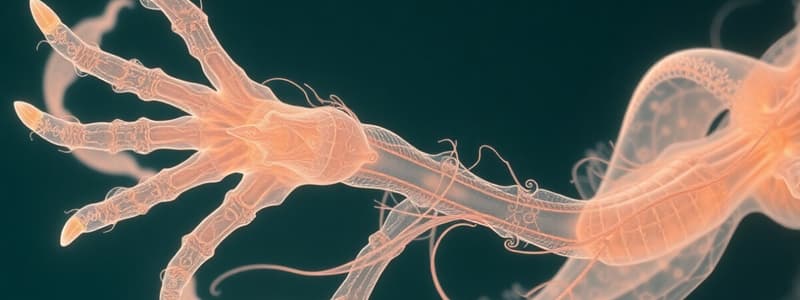Podcast
Questions and Answers
What significant anatomical development occurs during the canalicular phase?
What significant anatomical development occurs during the canalicular phase?
- Division of terminal bronchioles into respiratory bronchioles (correct)
- Establishment of the blood-air barrier
- Development of surfactant
- Formation of alveoli
Which statement best describes the difference between the canalicular and saccular phases?
Which statement best describes the difference between the canalicular and saccular phases?
- The saccular phase lacks respiratory vasculature development
- Both phases allow for fetal survival
- Surfactant is produced during the canalicular phase only
- The canalicular phase does not support fetal survival, while the saccular phase does (correct)
What is primarily produced by Type II alveolar cells during the saccular phase?
What is primarily produced by Type II alveolar cells during the saccular phase?
- Blood vessels
- Bronchioles
- Alveolar ducts
- Surfactant (correct)
Which of the following best explains esophageal atresia?
Which of the following best explains esophageal atresia?
What critical event in the development of the lung occurs from 34 weeks to childhood?
What critical event in the development of the lung occurs from 34 weeks to childhood?
What is the role of the apical ectodermal ridge in limb development?
What is the role of the apical ectodermal ridge in limb development?
During limb development, which of the following structures is responsible for producing dorsal characteristics in the limb?
During limb development, which of the following structures is responsible for producing dorsal characteristics in the limb?
At what stage does the limb bud formation occur?
At what stage does the limb bud formation occur?
Which of the following conditions refers to the absence of a part of a limb?
Which of the following conditions refers to the absence of a part of a limb?
What does a high concentration of Sonic Hedgehog (SHH) signal during limb development?
What does a high concentration of Sonic Hedgehog (SHH) signal during limb development?
At which stage does the respiratory diverticulum arise?
At which stage does the respiratory diverticulum arise?
Which structure is derived from the lateral plate mesoderm during limb development?
Which structure is derived from the lateral plate mesoderm during limb development?
What characterizes acrodolichomelia?
What characterizes acrodolichomelia?
Flashcards
Canalicular Phase
Canalicular Phase
Phase of lung development where respiratory bronchioles divide, alveolar ducts appear, and specialized cell types differentiate.
Saccular Phase
Saccular Phase
Phase of lung development where respiratory bronchioles subdivide into terminal sacs, the blood-air barrier forms, and surfactant is produced.
Tracheosophageal Fistula
Tracheosophageal Fistula
A congenital defect where the trachea and esophagus fail to separate completely, resulting in a connection between the two.
Esophageal Atresia
Esophageal Atresia
Signup and view all the flashcards
Surfactant
Surfactant
Signup and view all the flashcards
Apical Ectodermal Ridge (AER)
Apical Ectodermal Ridge (AER)
Signup and view all the flashcards
Zone of Polarizing Activity (ZPA)
Zone of Polarizing Activity (ZPA)
Signup and view all the flashcards
Limb Morphogenesis
Limb Morphogenesis
Signup and view all the flashcards
Sonic Hedgehog (SHH)
Sonic Hedgehog (SHH)
Signup and view all the flashcards
Embryonic Stage of Lung Development
Embryonic Stage of Lung Development
Signup and view all the flashcards
Pseudoglandular Stage of Lung Development
Pseudoglandular Stage of Lung Development
Signup and view all the flashcards
Adactyly
Adactyly
Signup and view all the flashcards
Apoptosis in Limb Development
Apoptosis in Limb Development
Signup and view all the flashcards
Study Notes
Limb Development
-
Time Course: Limb bud formation (4-8 weeks), Apical ectodermal ridge (AER) appears, limb pattern specification occurs, Sonic hedgehog (Shh) and Fibroblast Growth Factors (FGFs) appear caudally in the upper limb bud, limb morphogenesis (limb rotation), apoptosis separates digits.
-
Axes of Limb Development:
-
Proximal-distal: Base to tip (shoulder to digits).
-
Cranial-caudal: Thumb to pinky.
-
Dorsal-ventral: Palm to dorsum (back of the hand).
-
Apical Ectodermal Ridge (AER) Role: Forms the dorsal-ventral axis and drives proximal-distal development. Determines dorsal (back of hand) and ventral (palm) sides of the hand.
-
Mesodermal Core Specification:
-
Limb bud core from lateral plate mesoderm.
-
Wnt7a signaling directs dorsal structures.
-
Zone of Polarizing Activity (ZPA) on the posterior side secretes Shh, determining digit formation (low Shh = thumb, high Shh = pinky).
-
Somite and Lateral Plate Mesoderm Contribution:
-
Paraxial mesoderm (somites) → skeletal muscles.
-
Lateral plate mesoderm → bones, connective tissues, and vessels.
Limb Malformations
- Meromelia: Absence of part of a limb.
- Amelia/Ectromelia: Absence of one or more limbs.
- Phocomelia: Short, malformed upper or lower limbs (flipper-like).
- Hemimelia: Stunting of distal limb segments.
- Acrodolichomelia: Disproportionately large hands or feet.
- Ectrodactyly: Absence of one or more fingers or toes.
- Polydactyly: Presence of extra digits or parts of digits.
- Syndactyly: Fusion of digits.
- Adactyly: Absence of all digits on a limb.
Lung Development
-
Embryonic (22 days–6 weeks): Respiratory diverticulum (outpouching of foregut endoderm) branches three times, forming lung primordia, lobes, and bronchopulmonary segments. The diverticulum stem forms the trachea and larynx.
-
Pseudoglandular (6–16 weeks): Respiratory tree branches 14 times, forming terminal bronchioles.
-
Canalicular (16–24 weeks): Terminal bronchioles divide into respiratory bronchioles. Respiratory vasculature develops, vessels near lung epithelium. Lung epithelium differentiates (ciliated, secretory, neuroendocrine). Alveolar ducts appear.
-
Terminal Sac/Saccular (24 weeks–birth): Respiratory bronchioles subdivide into terminal sacs. Blood–air barrier forms. Type II alveolar cells produce surfactant.
-
Alveolar (34 weeks–childhood): Alveoli mature.
Canalicular vs. Saccular Phases
- Canalicular: Fetus cannot survive; respiratory bronchioles divide, alveolar ducts form.
- Saccular: Fetus can survive with neonatal care; respiratory bronchioles form terminal sacs, blood–air barrier develops, surfactant produced.
Tracheosophageal Fistula vs. Esophageal Atresia
- Fistula: Incomplete separation of foregut into trachea and esophagus; fluid aspiration into lungs.
- Atresia: Abnormal connection between trachea and esophageal lumens; closed esophageal end; no nutrition intake, vomiting.
Studying That Suits You
Use AI to generate personalized quizzes and flashcards to suit your learning preferences.




